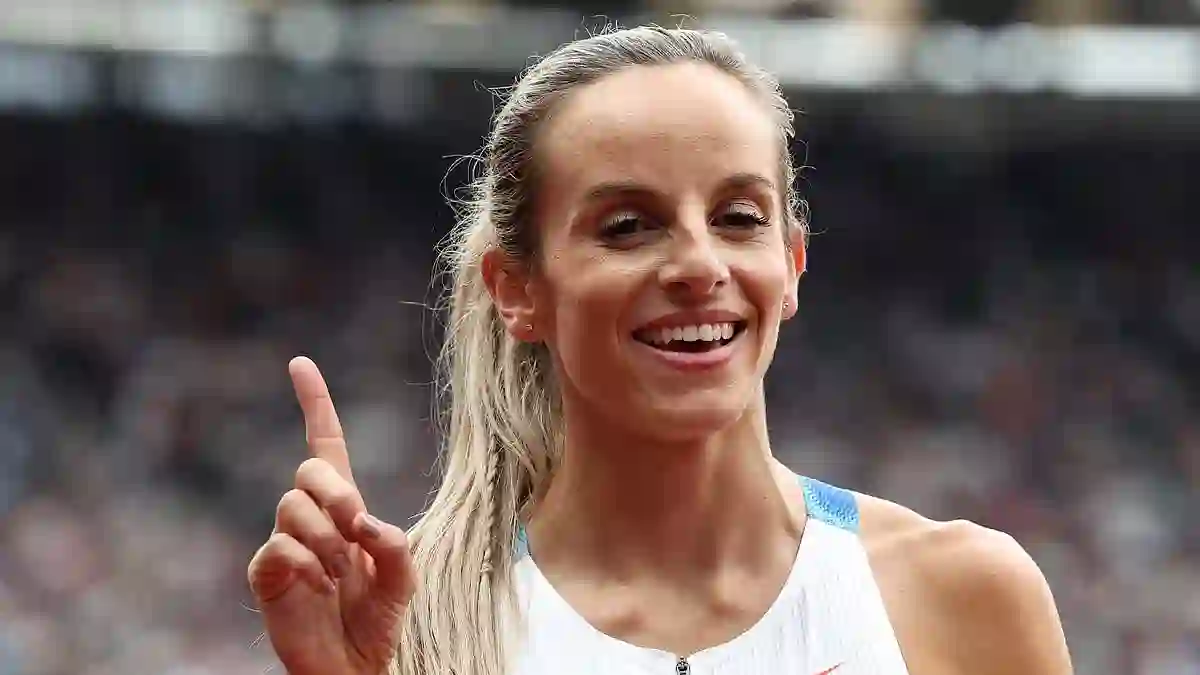In a stadium packed with 60,000 roaring fans, Georgia Hunter Bell picked the perfect moment to shine.
With her training partner Keely Hodgkinson out due to injury and big names like Noah Lyles and Josh Kerr falling short, it was Hunter Bell who delivered a feel-good surprise at London Stadium during a dramatic Diamond League meet.
The 31-year-old runner, often overshadowed by Britain’s middle-distance stars, took full advantage of the moment—proving she’s more than just a support act.
A Career-Defining Win at Home
Hunter Bell, already an Olympic bronze medallist in the 1500m, hadn’t always received the same level of fanfare as the widely celebrated Keely Hodgkinson.
But with her friend and training partner recovering from a hamstring issue, this was her time—and she didn’t waste it.
She stormed to victory in the 800m, clocking a season-best 1:56.74, beating a strong international field and leaving fellow Brits Jemma Reekie and Laura Muir behind.
Could She Take on a Double Challenge in Tokyo?
With the World Championships in Tokyo this September, Hunter Bell now faces a tempting question: should she compete in both the 800m and 1500m?
“The schedule actually makes it possible,” she said after the race.
“I might reach out to Kelly”—as in Dame Kelly Holmes, who famously won Olympic gold in both events in 2004. “We’ll see. It’s hard, but it’s doable.”
London’s Bid for the 2029 World Championships Brings the Buzz
Hunter Bell’s breakout performance came on the same day that Team GB officially launched its bid to host the 2029 World Championships and World Paralympics in London.
“You can really feel the support in this stadium,” she said. “The noise for us British girls was unreal.
Hosting the worlds here would be incredible.”
The bid was announced by Athletics Ventures and backed by Prime Minister Keir Starmer, who called the plan a potential “moment of great national pride” and a boost for UK jobs and businesses.
Hodgkinson’s Comeback Still on Track
Although Keely Hodgkinson hasn’t raced since the Olympics due to her hamstring injury, Hunter Bell said not to count her out.
“She’s doing well,” she said. “No one wants to be out there more than Keely.
She’ll be back soon. We train together and push each other. That’s what makes us both better.”
Surprise Defeats for Lyles and Kerr
While Hunter Bell was celebrating, others had a tougher time.
Josh Kerr, Britain’s reigning world champ in the 1500m, was beaten by 18-year-old Kenyan Phanuel Koech, who stunned the crowd with a time of 3:28.82.
Fellow Brit Jake Wightman, who finished fourth, downplayed the result.
“These Diamond League races are about pacing,” Wightman said.
“Championships are a different game—you have to be smart when there’s no pacer.”
In an even bigger upset, Noah Lyles, the Olympic 100m champ and “fastest man alive,” was left looking sluggish next to Jamaican sprinter Oblique Seville, who sprinted to 9.86 seconds.
For Lyles, it was his first 100m since Paris—and he tried to brush it off: “No need to panic.”
British Mixed Bag in Other Events
There were more homegrown wins and losses.
Charlie Dobson claimed a victory in the 400m, beating fellow Brit Matt Hudson-Smith.
But the day didn’t go as planned for other UK stars: Dina Asher-Smith, Katerina Johnson-Thompson, and Molly Caudery all came up short in their events.
A Long-Overdue Gold Medal Moment
One of the most touching moments of the day wasn’t even about current races—it was about justice delayed but finally delivered.
The British 4x400m men’s relay team from the 1997 World Championships finally received their gold medals, 28 years after being upgraded from silver when it was revealed that Antonio Pettigrew of the U.S. team had used performance-enhancing drugs.
Athletes Roger Black, Iwan Thomas, Jamie Baulch, Mark Richardson, and Mark Hilton were all finally together in one place to be honored.
For Thomas, the medal had special meaning—he gave it to his young son Teddy, who spent time in intensive care as a baby battling a serious infection.
A Bittersweet Ceremony With a Dark Past
The medal ceremony wasn’t without emotion or reflection.
Pettigrew, the athlete whose disqualification upgraded Britain’s medal, died by suicide in 2010.
Jamie Baulch acknowledged the mixed feelings: “I’d rather he had kept the gold than lost his life.”
London Aims High, but Faces Tough Competition
While excitement around the 2029 World Championships bid is building, World Athletics president Sebastian Coe made it clear that London won’t have it easy.
“Yes, we’re a nation that loves athletics. And yes, people show up,” he said.
“But there are other strong cities interested too. It’s going to be competitive.”
Still, if days like this are any sign, British athletics is ready to take center stage once again.
